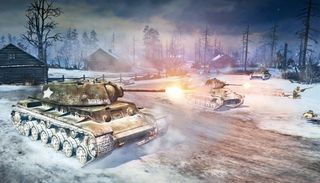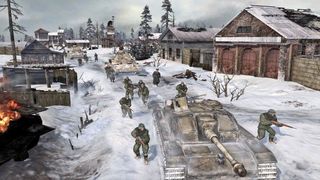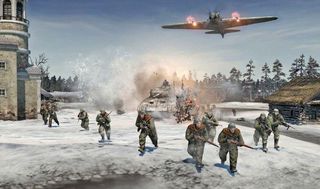
This article originally appeared in issue 247 of PC Gamer UK. Written by Craig Lager.
War on the Russian steppe is very different to the Normandy landings. You can't learn about it simply by watching Saving Private Ryan over and over again, for one thing.
“We do an obsessive amount of research about the setting, about our feeling of what the intensity should be, and how to deliver that in a game,” says Relic's Quinn Duffy. “We could never get close to the real feeling, but we try. Our approach to authenticity is not about getting every bolt in the right place, it's about making sure that a T-34 feels like a T-34.”
The mission I played was split into two parts: first, raid a small German encampment, then repair and reclaim a broken light tank. Starting out, Company of Heroes 2 feels very familiar – the same view, control scheme and general mechanics as Relic's last few games welcome you in. But, as you progress, what initially seem like small changes start to make a big difference.

Weather and the cold play an important role, for example. Just outside that first encampment I split my force up so that half could push straight on, as the other half vaulted a fence and went through a field to flank. I found out too late that the field was covered in deep snow, reducing my units to a crawl. When the Germans spotted them, exposed and trudging through snow drifts, they invented the word 'schadenfreude'.
Without fire support, my central force was in serious trouble. But this is not Company of Retreaters. They held on, they pushed, and eventually they managed to get close enough to the objective for me to be granted a special ability: air support. Machine guns from a circling plane ripped through the base, slaughtering everyone.
The next job was to traverse the countryside to reclaim a tank on the other side of a frozen lake. The environment in CoH2 can be as deadly as German bullets – without shelter or a fire to keep warm, soldiers will die off, silently falling into the snow one by one as the harsh weather sets in. It's grim, sombre, and pushes the game more into the moral and ethical reflections of war rather than only blowing stuff up.
The biggest gaming news, reviews and hardware deals
Keep up to date with the most important stories and the best deals, as picked by the PC Gamer team.
Quinn offers another example: “If the enemy leaves a casualty on the battlefield and they're crawling away, those casualties are still providing line of sight. My decision as a player is 'do I shoot that guy?' because he's giving an advantage to the enemy. It's just a little thing, but it adds some of that choice and consequence to the battlefield.”

'Run across this frozen lake towards the Germans' is not the most strategically sound order to have ever been given in a pretend war. However, Russian troops know better than to question orders from The Motherland, so bravely they ran across, and bravely they got pinned down by machinegun fire, and bravely mostly bled to death in the cushioning snow.
Those few survivors didn't last much longer. The barrage of gunfire had weakened the ice, so when a grenade landed amongst the troops, the outcome was unavoidable. The ice collapsed, plunging them into the frozen depths. A restart and a new strategy of 'go around the lake' let me attack the tank's position. I pushed the Germans back enough for my engineers to reach the tank, get it fixed, and then jump some guys in. The enemy force brought in a tank as well, and we exchanged a couple of shells before that exploded too. I smile and admire the carnage, but then Quinn speaks and I don't want to smile any more.
“You see one of these tanks blow up? You can draw a lot of inspiration from the experience and horror, because you know it's not just a tank exploding. There are four or five guys in there burning to death. There's a pressure to make it feel right.”
Company of Heroes 2 does feel right. What I've played perfectly captures the grim tone of war while still being an exciting and tactical RTS. Hopefully you won't be too depressed to play it.
PC Gamer is the global authority on PC games—starting in 1993 with the magazine, and then in 2010 with this website you're currently reading. We have writers across the US, Canada, UK and Australia, who you can read about here.
Most Popular

